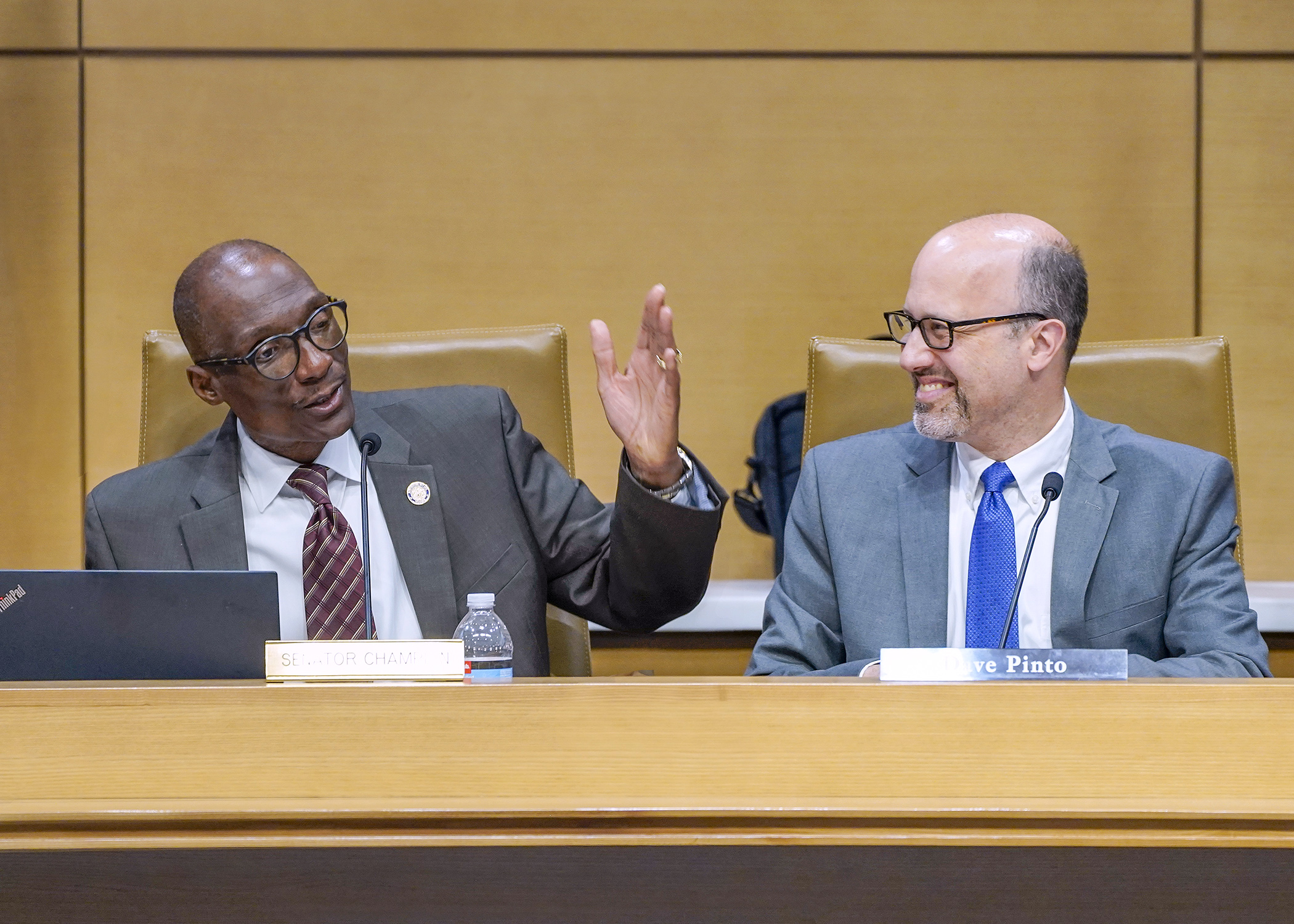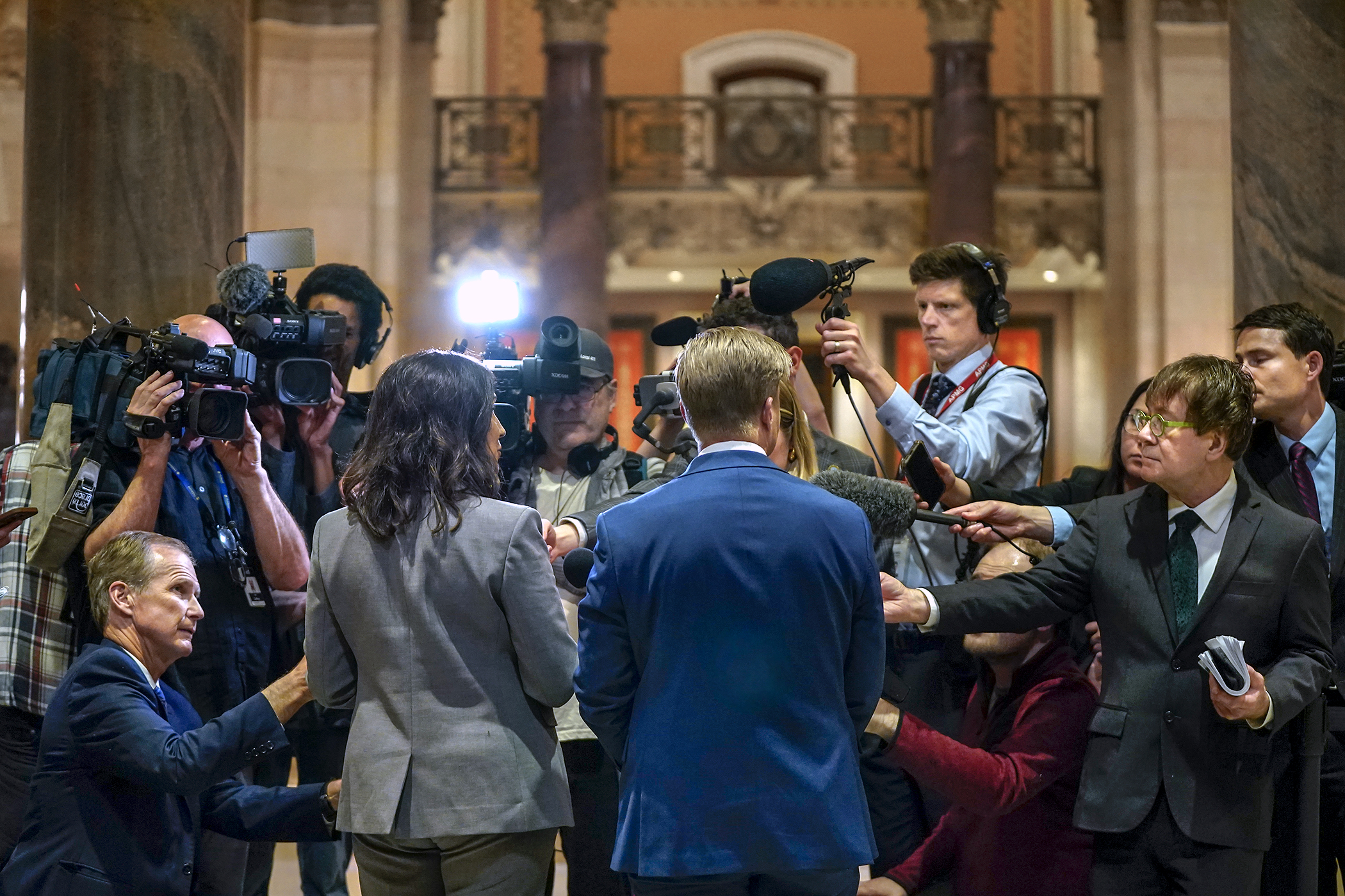Significant gap between House, Senate workforce budgets as conferees seek agreement

A list of more than 50 organizations and $100 million. Those are differences that jump out from the House and Senate versions of the omnibus workforce, labor, and economic development finance and policy bill.
A conference committee on HF2440/SF1832* began work Tuesday, bridging a significant funding gap for state agencies as well as more than 50 economic development groups, worker training programs and nonprofit organizations. Rep. Dave Pinto (DFL-St. Paul) and Senate President Bobby Joe Champion (DFL-Mpls) are the sponsors.
Champion said the 11-member committee will work together to resolve those differences. “Together is the operative word.”
The House Workforce, Labor, and Economic Development Finance and Policy Committee was tasked by leadership to cut $50 million in its 2026-27 biennial General Fund appropriations for workforce and economic development programs. Its target also included no new spending from the Workforce Development Fund.
In contrast, the Senate budget would provide a net increase of $50 million over the February forecast base, including an increase of $10 million in spending from the General Fund and $40 million from the Workforce Development Fund.
Moreover, the House version would limit appropriations directed to specific organizations and training programs in favor of competitive grants. The Senate provides one-time funding to more than 50 ranging from $42,000 to the Aspirus Lake View Hospital for a “grow-your-own” certified nursing assistant training program to several grants of $2 million or more, such as to Goodwill Easter Seals for its FATHER Project.
The Senate would also increase some inspection and licensing fees, which is expected to raise an additional $21.33 million per biennium to the Labor and Industry Department’s Construction Code Fund.
Commissioner Nicole Blissenbach wrote leaving fees at the current levels would result in staff layoffs and increased wait times.
[MORE: View the comparison spreadsheet, detailed workforce development spreadsheet, detailed labor spreadsheet]
Policy provisions
The House alters some grant and loan programs, allowing nonprofits that received directed appropriations in the past to apply for competitive grants. This includes modifying small-business assistance grants to include revitalizing commercial districts and altering youth and work programs to include preemployment services and mentoring.
Other House-only provisions would:
- allow noncompete clauses in some cases;
- repeal requirements to produce two expensive and redundant reports;
- narrow the definition of a nursing home to exclude veterans’ and tribal homes;
- provide additional whistleblower protections for state employees; and
- require a misclassification report from the Employment and Economic Development, Revenue, and Labor and Industry departments, which is expected to include analysis of payroll tax underpayment.
The Senate bill includes a provision that would provide an additional 26 weeks of unemployment benefits related to layoffs at mines on the Iron Range.
It would also specify that an employer must provide a 30-minute meal break for anyone working six hours. Eight is current law. Employees would also get a minimum rest break of 15 minutes per four hours worked with a fine of $1,000 per employee per day for violations.
Other Senate-only provisions would:
- raise the penalty percentage from 50% to 100% unemployment benefits amounts for overpaid or not paid benefits;
- create a pilot program for free professional licenses; and
- lower the minimum loan amount for the community wealth building program from $50,000 to $10,000.
[MORE: Workforce committee advances budget bill; side-by-sides for jobs policy and jobs appropriations; summary of policy same/similar/different policy provisions]
Committee member introductions offered an inkling that differences in policy may be between caucuses rather than chambers.
Rep. Dave Baker (R-Willmar) said the work before the committee is to identify how to protect workers and ensure Minnesota stays competitive. He has indicated he’d like to see adjustments to the state’s earned sick and safe time and paid family leave programs.
Rep. Emma Greenman (DFL-Mpls) said the work is to level the playing field for workers.
Related Articles
Search Session Daily
Advanced Search OptionsPriority Dailies
Legislature — with budget incomplete — gavels out, prepares for special session
By Rob Hubbard Some years, state legislative sessions surge to a climax on their final day, a flurry of activity providing a sustained adrenaline rush, culminating in smiles of satisfaction as...
Some years, state legislative sessions surge to a climax on their final day, a flurry of activity providing a sustained adrenaline rush, culminating in smiles of satisfaction as...
Walz, lawmakers strike budget deal in session's final days
By Lisa Kaczke With five days to go in the 2025 session, three of four legislative leaders announced a budget agreement Thursday that would sunset unemployment insurance for hourly school empl...
With five days to go in the 2025 session, three of four legislative leaders announced a budget agreement Thursday that would sunset unemployment insurance for hourly school empl...